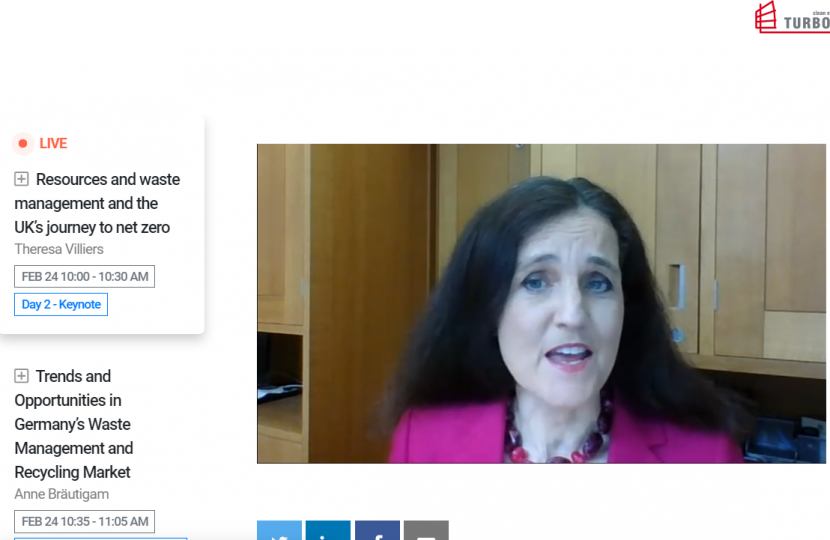
Chipping Barnet MP Theresa Villiers praised the waste industry and local councils today for their Covid response and the vital role they will play in meeting the UK’s 2050 net carbon neutral target.
Speaking at the virtual Recycling and Waste Management (RWM) conference, Theresa said the Government’s climate change ambitions were world leading and amounted to a “formidable list of environmental commitments”.
However, she also warned delays in getting the Environment Bill through Parliament were frustrating.
“Ministers aspire for this country to be a world leader in using resources efficiently and reducing the amount of waste we create as a society, moving away from the ‘linear’ economic model of ‘take, make, use, throw’,” she told delegates.
“And, of course, the resources and waste sector and local government are at the vanguard of efforts to deliver these lofty ambitions.
“Whilst it may lack the glamour of some other sectors of our economy, what happens to our waste has an undeniable day-to-day impact on all of us.
“This was clearly illustrated in the early days of the first Covid lockdown when no one quite knew what the impact of the disease would be on front line services.
“I for one have never been more relieved to see the Barnet waste trucks out as normal.
“Everyone in the waste sector deserves our gratitude for keeping these vital services going through this very difficult year, especially those on the front line.
“And there can be no doubt that this is a sector which will be central to whether we achieve our goals on climate change and the environment or whether we don’t.”
Theresa added that a big challenge for the Government in the lead up to COP26 in Glasgow later this year was creating the right conditions for investment to take place, but that would not be enough.
“Infrastructure projects - essential though they are - will not get us to net zero or resource efficiency on their own. We need behaviour change as well.
“Despite advances in technology in recent decades, the average life span of many products we buy and use in daily life is actually lower than it was 20 years ago.
“Better decisions and design at the production stage can make it much easier to recover and regenerate products and materials, giving them a new lease of life and driving the desired shift from a linear to a circular approach to our consumption of limited natural resources.
“The charging scheme for single use plastic bags shows that dramatic shifts in consumer behaviour are possible, as shown by the plummeting use of bags.
“We all have a part to play in delivering the change we need in extending the lives of products through repair, reuse and remanufacture.
Theresa added that the UK had made huge progress on decarbonisation. “Since 1990, we have cut emissions by 40% while the economy has grown by two thirds,” she told the conference.
“But everyone watching this speech today will know that there is much more to do before we can be confident of achieving the environmental improvements we have promised.”
Following the speech, Theresa singled out Barnet Council and its front line waste collection teams for praise for their efforts during the pandemic.


